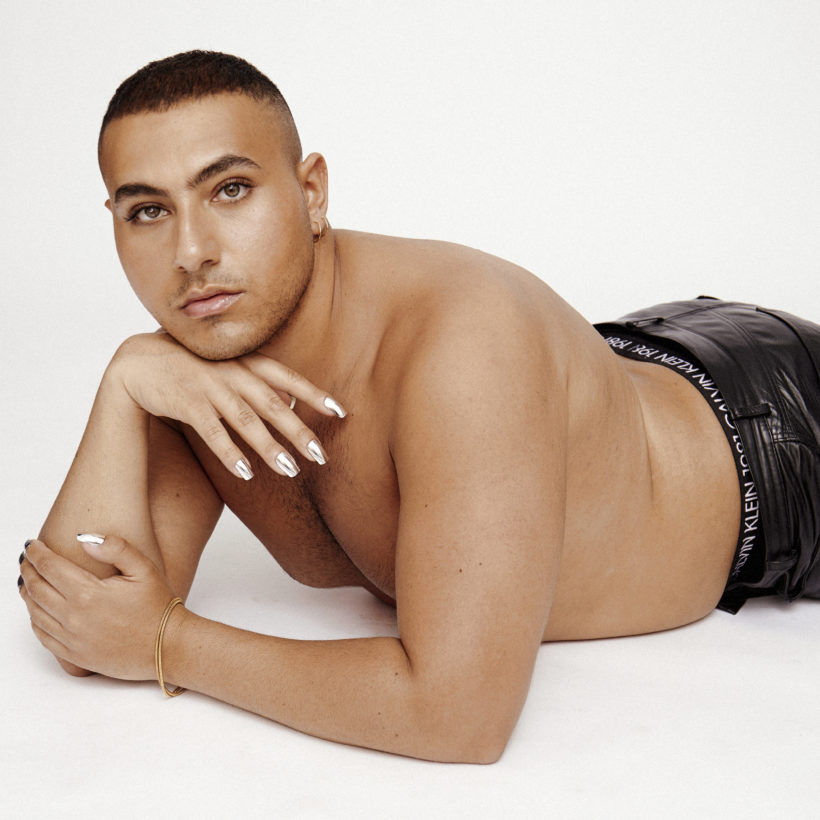Denver Sean
As the editor in chief for the entertainment website LoveBscott.com and host of the podcast Drink with Denver, Denver Sean calls out that the people historically “in charge” of representation in the media have largely been cis-gendered white men. “The media started with the ‘conventionally attractive’ representation. But now, we’re [finally] starting to get more diverse representation in media representation because white [standards of beauty] aren’t going to cut it. I feel it’s going to take men of color to push the body positivity movement to include more men,” he says. Below, he talks about the pressure to adhere to society’s biased standards and for LGBTQ+ representation in the fashion and beauty industry.
Sunday Edit: What is one of your biggest criticisms of LGBTQ+ male representation in the beauty and fashion industry?
Denver Sean: The typical ‘Hollywood’ standards haven’t changed: chiseled abs, strong jawline, tall, dark, handsome, etc. Regardless of what we’re occasionally shown, that’s been the standard. Every time the media highlights anything else, it’s lauded as ‘other’ or ‘an exception’ when in reality, it’s the media’s portrayal of the male body image that’s the exception. Most people don’t look like Hollywood, despite what Instagram will make you believe.
Male LGBTQ+ representation in the beauty industry is something… else. To be male and to be LGBTQ+, when I look at the beauty industry, I rarely ever see myself. I go to many beauty events here in Los Angeles, and I’m usually one of five people of color in the room of 200 and most likely one of five not in a full-glam makeup look. I think it once was an industry of hair and makeup primarily aimed at women — and then, in large part thanks to social media, we’ve seen the hair and makeup beauty industry expand to include men and non-binary individuals. Now we see a shift to include skincare and grooming as part of the beauty industry. I think there’s a real opportunity to represent everyone.
We teach women all of the time, ‘You don’t have to wear makeup to be beautiful.’ Well, now I think it’s time to add, ‘You don’t have to wear makeup to be part of the beauty industry.’ I wash my face, and I feel beautiful. I layer my serums and walk out of the door with my skin glowing — I feel beautiful. I get my mustache and beard lined up just right — I feel beautiful. And I know I’m not the only one, but I want to see more of ‘that’ represented in the male beauty industry.
SE: Can you describe a time you have felt self-conscious due to portrayals of body image or LGBTQ+ male representation in the media?
DS: I live in LA, and I’m on social media, and there are dozens of ridiculously attractive people literally in the palm of my hand every day. I’m always self-conscious about my body; it just is what it is. But what I’ve learned in talking to people who have what I consider ‘the perfect body,’ they’re also self-conscious about their bodies and they’re constantly comparing their bodies to the people they think have ‘the perfect body.’ Spoiler alert: There is no [single] ‘perfect body,’ but the body you have is the perfect body.
SE: What advice do you have for avoiding body comparisons when scrolling our social media feed?
DS: One of the biggest lessons I’ve learned in general is that just because things are how they are, doesn’t mean it’s how things are supposed to be and that applies to gender, sexual orientation, and relationships. Speaking to people of varying experiences worldwide is one of the best — and sometimes the worst — aspects of social media. But with life, you have to take the good with the bad. It’s all about discernment.
Social media is the one thing wreaking havoc on relationships with bodies. First, understand that nothing you see on social media is 100% real. Nothing. Secondly, follow people with bodies that look like yours who are enjoying life and having fun. Curating your feeds can make a huge difference in your perception of what makes a beautiful body. Lastly, sometimes you just need to put your phone down. Do something different or challenging, whether it be a walk outside, a dance, a swim, or meditation. Remind yourself that your body got you this far, and be thankful for what it can do.
SE: What advice would you give brands, media, etc., looking to support the LGBTQ+ community in an authentic and impactful way?
DS: This seems so easy, but it’s rarely done: Just include us. Most LGBTQ+, when a brand does something involving the LGBTQ+ community or featuring an LGBT person, it’s usually during Pride month, or the brand makes sure to highlight the fact the person is a member of the community. So we either get to do the Pride campaigns or be the featured gay couple kissing in a Christmas commercial, but not just the random person doing laundry on a Tuesday. Some brands do it right, but most only reach for the community when it’s time to make a statement. Supporting the LGBTQ+ community shouldn’t always have to be a statement.
SE: How do you filter out criticisms from people online who may hate the fact that you choose to love yourself out loud?
DS: I have to filter out keywords and [block trolls] on social media for my sanity. My job is to have an opinion on pop culture and celebrities — and everyone has fans! I learned early on that one of the easiest ‘jabs’ from random fans I’ve pissed off online is to go for my sexuality.
I’ve got two things from Kim Kardashian that have helped me navigate online criticism: First, sometimes online criticism can feel way more overwhelming than it is. If you can, figure out if there are a lot of upset people all saying one thing, or if there are just a few upset people making a lot of noise. It’s usually the latter and a few noisy people in the grand scheme of everyone else being supportive isn’t a big deal. Secondly, people will always have something to say online, whether it be positive or negative. The beautiful thing about online criticism is that it’s online. Just put your phone down, and it all falls silent. It allows you to step back into your day-to-day life and focus on the people around you. Your family, your friends, the people who love you, the people you love — it’s all real. That’s what you focus on.
With additional reporting by Christa Lee.







